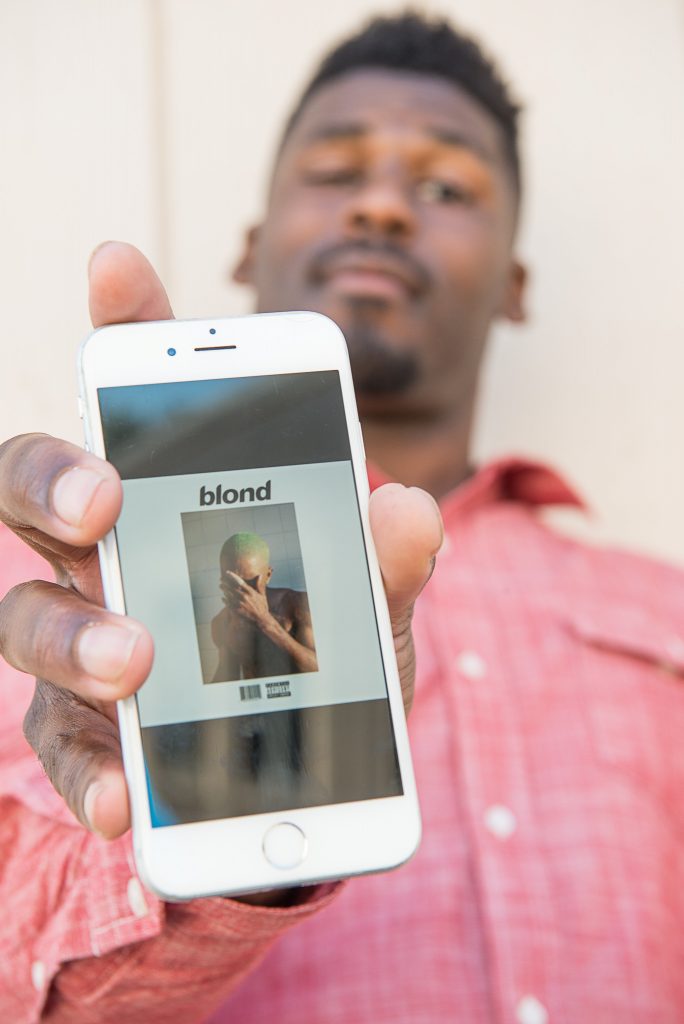Frank Ocean’s ‘Blonde’ shows deep roots but lacks definition

By Abdul-Latif Islam
Frank Ocean has finally released the long-awaited “Blonde,” a gender and genre-bending collection of innuendos sprinkled with drugs, cars and glitter that confounds and disappoints.
Throughout “Blonde,” Ocean pairs subtle autobiographical perspective with discordant electronic arrangements for a manufactured irony. The result is a muted soundscape that is similar to jazz, yet lacks the genre’s rawness of emotions.
While Ocean’s taciturn craftsmanship is apparent, his artistry requires repeat listening to detect. However, with each play it becomes apparent that the album is disjointed and merely a collection of tracks he has worked on for the past four years.
Promotional single “Nikes” personalizes the political. Ocean declares “Trayvon Martin looks like me” and poignantly addresses how black men see themselves reflected in images of murdered black men across the United States.
Yet in the same song, Ocean utilizes autotune to obscure and limit the impact of lyrics celebrating his meeting with a male lover’s friends. This is repeated in “Good Guy,” where autotune muffles mention of being taken to a gay bar.
Lessening these lyrics is a letdown to his gay fanbase, which he has cultivated through social media posts over the years.
In “Solo,” Ocean sings of jaded isolation with heartfelt yet confounding lines such as ”there’s a bull and matador dueling in the sky” at the top of his lungs. The execution distracts from the meatier body of the song.
This is a sullen shift from 2012’s “Thinkin Bout You,” where Ocean communicates an unadorned and direct passion that demanded attention and continuous play.
During a four-year hiatus, Ocean has been featured alongside musical heavyweights such as Beyoncé and Kanye West. For “Blonde,” Ocean tempers his bravado and diverts the spotlight, but André 3000’s reprise of “Solo” overpowers Ocean’s original.
In “Be Yourself,” Ocean plays a voicemail of a woman known as Mom preaching against the evils of alcohol and marijuana. This not Ocean’s mother but Auntie Rosie, who was also featured on “Channel Orange” in the same nagging manner.
Having a repeat disrupts the sophomore album’s vibe and shows a lack of growth from 2012.
Another piece of filler is the anecdote “Facebook Story,” which is simply a recording of French music producer SebastiAn.
“Blonde” does have moments of inspiration. “Pink + White” secures a place on every break-up playlist this autumn as an earnest and effortless song produced by Pharrell Williams with backing vocals by Beyoncé.
It vies for the title of best track with the prayer-like “Godspeed,” where Ocean and gospel singer Kim Burrell ascend emotionally. The impressiveness of their combined vocals underscore how timid Ocean’s singing is on the remainder of the album.
On his Tumblr blog, Ocean states “Consciously, I don’t want straight… a little bent is good” in response to criticism of his love of cars.
The same can be said for “Blonde.” It bends so much to avoid a narrative that it loses shape and form.
